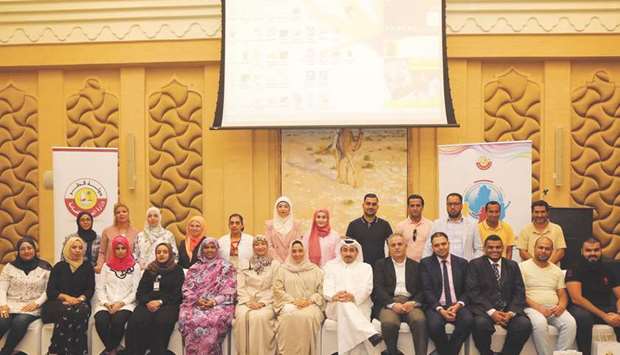The Ministry of Public Health has organised a training workshop for nursing staff in the public elementary schools participating in the Asthma-friendly Schools Programme for the academic year 2018/2019.
The programme is being implemented this year in 112 schools. It will be extended to all schools in the country in stages.
Around 180 nurses participated in the workshop, during which they were introduced the Asthma-friendly Schools Programme, the mechanism of its application and follow-up, and the lessons learned from previous experiences, as well as several other important topics such as pathogens, symptoms, irritants and ways to avoid them within the school, and how to use both the strength gauge of the air flow of the lung and the medicines of asthma disease by correct means, to train students with asthma in schools to use the medicine and the device in a proper way, in addition to the asthma crisis and how to prevent and treat it at school.
Dr Kholoud al-Mutawa, head of non-communicable disease section at the Ministry of Public Health, stressed that the Health Ministry co-operates with the Ministry of Education and Higher Education, HMC, Primary Health Care Corporation (PHCC) and other partners to reduce the percentage of patients with asthma and improve the quality of life for students who are suffering from the disease.
Dr Kholoud pointed out that asthma is considered one of the most common long-term diseases in children, and said that although it is not possible to cure it, it can be controlled by receiving proper medical care and improving the living conditions of the patient.
According to the World Health Organisation (WHO) estimates, 235mn people suffer from asthma globally.
Dr Maya al-Shaybah, supervisor of the Asthma-friendly Schools Programme at the Ministry of Public Health, explained that the programme represents a unique learning experience designed to allow students with asthma to make the most of the available medical potential and live in a supportive natural social environment that helps develop their skills and improve their quality of life.
Meanwhile, Dr Mahdi al-Adly, senior consultant for Immunology and Allergy at Hamad Medical Corporation, explained that students with asthma are trained by nurses on how to use the medicine and the peak flow meter of the air that comes out of the lung in a proper way.
Dr Hisham Abdel Moneim, a paediatric specialist at PHCC, emphasised that the programme is centred on the understanding of the disease and its dimensions and how to manage it by identifying and documenting the cases of students with asthma in participating schools, providing rapid access to the drug, as well as establishing a mechanism to address the growing incidence of asthma in the school, and to identify and reduce exposure to asthma attacks within the school environment.
The main goal of the Asthma-friendly Schools Programme is to improve the quality of life and health outcomes of children with asthma in Qatar’s schools. It targets students in the age group of 6 to 12 years who suffer from this disease.

Officials and participants attending the Asthma-friendly Schools Programme.
